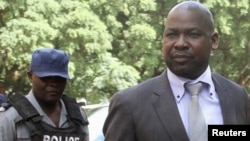The Zimbabwe Lawyers for Human Rights and the country’s leading legal minds have condemned the arrest of prosecutor general Johannes Tomana calling it an assault on the rule of law and the justice delivery system.
But the state maintains that he criminally abused his office by releasing two army officers detained on January 22 for allegedly attempting to bomb Gushungo Dairies (Pvt) Limited, President Robert Mugabe’s family business in Mazowe district, about 20 miles north of Harare.
Lawyer, Dzimbabwe Chimbga of the Zimbabwe Lawyers for Human Rights says his organization is disturbed by the arrest Monday and detention of Tomana, and his appearance in court Tuesday on charges of criminal abuse of office or alternatively obstructing the course of justice.
Chimbga says the independence of the prosecutorial authority in Zimbabwe is constitutionally protected.
"Further safeguards exist under regional and international law. These provisions empower prosecutors to exercise their functions impartially and without fear or favour. The head of the National Prosecuting Authority, the prosecutor general is entitled to such protection."
Leader of the opposition National Constitutional Assembly Lovemore Madhuku concurs.
Lawyer Terrence Hussein, who has represented President Robert Mugabe on many occasions, argues that the arrest did not follow the dictates of the country’s supreme law.
But were the police not right in charging Tomana for releasing treason suspects? Hussein says the law is the law.
But is there a legal precedence to this development? Legal law expert Dr. Alex Magaisa of Kent University said Zimbabwe's former attorney general Sobusa Gula Ndebele was also once arrested for allegedly abusing his office.
The law of the land does not permit the immediate arrest of a sitting judge or prosecutor general. This has led Dr. Magaisa to conclude that the arrest dove-tails with the serious factional fights in the ruling Zanu-PF party.
With the country’s legal minds agreeing that the arrest of Tomana was unconstitutional, what then can be done to correct it?
Madhuku said, “Now to avoid serious complications that would arise from what has already happened and to safeguard the rule of law, the president (Mr. Mugabe) has no option but to appoint a tribunal under Section 187 (of the constitution) so that the prosecutor-general is automatically suspended pending the outcome of the investigations by the tribunal. This would allow a clean way for the return of the prosecutor-general to his office.”
Tomana, who has declared his allegiance to the ruling Zanu PF party, is not without his critics in the country. Human rights and political activists have accused him of siding with Zanu-PF and abusing his office.
But some lawyers say the issue is not about Tomana the man but the office of the prosecutor general which must be protected so Zimbabwe cannot become a banana republic.
Meanwhile, the opposition Movement for Democratic change party led by former Prime Minister Morgan Tsvangirai and the People’s Democratic Party have condemned the arrest of of the prosecutor general.
In a statement, MDC T secretary for legal affairs Jessie Majome said the party is “bemused by the startling arrest and prosecution of the Prosecutor General.”
The party further hopes that "this sensational development is a big lesson to the prosecutor general and all law enforcement authorities and officials that they must pursue justice and fairness and respect the constitutionally enshrined fundamental rights and freedoms of everyone including those they consider as political foes or of low social status. The prosecutor general as everyone else, has the right to equal protection and benefit of the law. “
Spokesman Jacob Mafume of the People's Democratic Party in a statement said the opposition group noted the arrest of the Prosecutor General (PG), Johannes Tomana on Monday and his appearance at the Harare Magistrates’ Courts on charges of abuse of office.
The party said, “While we are tempted to say the chickens are coming home to roost, we, however, must hasten to add that Tomana, as the head of the National Prosecuting Authority (NPA), should show gratitude to the call by democratic forces in ensuring that the independence of the work of the Prosecutor General was enshrined in the new Constitution.
"The people of Zimbabwe have also been against the abuse of Section 121 of the Criminal Procedure and Evidence (CPEA). This section, which Tomana has previously abused for his own selfish interests, saved him from being denied bail on Tuesday."















